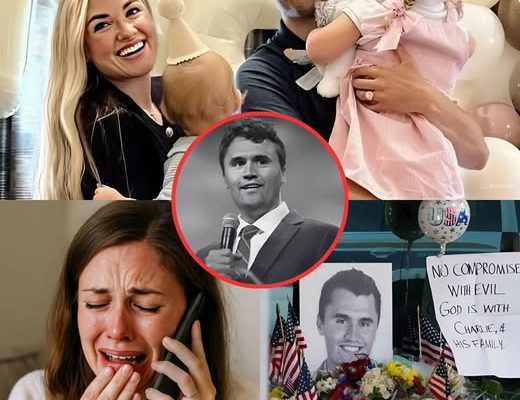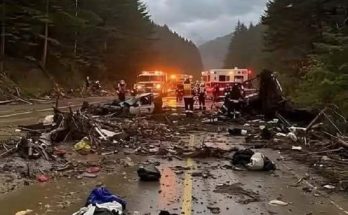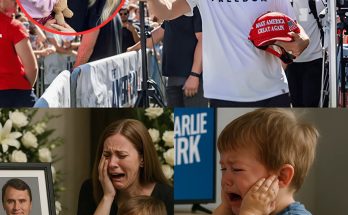Charlie Kirk’s wife received a final call from him.
On the morning of what would become an unforgettable tragedy, Charlie Kirk, the 31-year-old founder of Turning Point USA, placed a phone call to his wife, Brittany Kirk. At first glance, the conversation appeared routine—light-hearted chatter, a few reminders about the kids, and the kind of domestic warmth many couples share every day. Yet, beneath the ordinary tone, there were subtle, almost imperceptible signals of unease. Within minutes, what began as a normal phone call would turn into a haunting memory, leaving Brittany, their children, and millions across the nation reeling.
The call, according to those close to the family, lasted only a few minutes. Charlie’s voice, warm and familiar, carried a playful edge that initially reassured Brittany. “We talked about lunch plans, school projects for the kids, and our weekend schedule,” she later recounted. “He sounded normal. But then, there were these brief pauses, a hesitation here and there… I didn’t understand it at the time, but now, I know it was him sensing danger.”
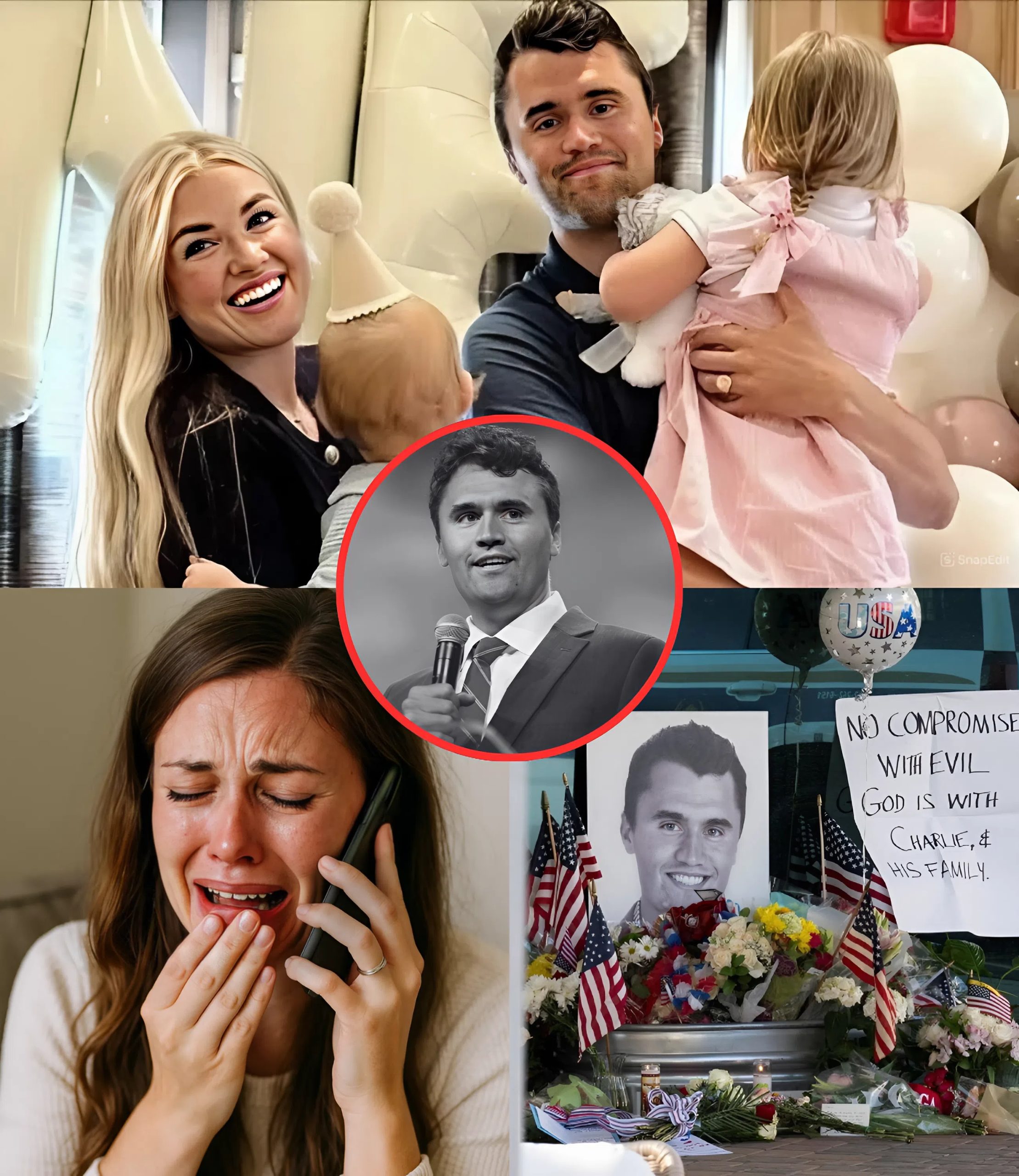
Moments after the call ended, chaos erupted at the University of Utah, where Charlie was attending a speaking event. An unidentified assailant opened fire, and despite wearing a bulletproof vest, Charlie was struck in a lethal twist of fate. Witnesses described a surreal scene of panic—students screaming and scrambling for cover, professors shielding their students, and the sound of gunfire echoing through a place that moments earlier had been calm and ordinary. The campus transformed instantly from a safe, familiar environment into a nightmare.
Security footage and subsequent investigations revealed that the assailant had exploited a small lapse in security, entering the venue with ease and turning a moment of academic engagement into a catastrophic event. The rapid unfolding of the tragedy left little room for reaction or protection, making the situation more terrifying and senseless than anyone could have imagined.
Yet, what has drawn particular attention and global fascination is the content of that final phone call. Experts in behavioral psychology and voice analysis who reviewed the call noted subtle indicators of stress and apprehension in Charlie’s speech—micro-pauses, minute changes in intonation, and fleeting hesitation—all of which suggested that, consciously or unconsciously, he sensed danger. “These are the kinds of cues most people overlook in everyday conversations,” explained Dr. Karen Whitfield, a psychologist specializing in microexpressions and vocal stress. “They often reflect subconscious awareness of a threat, even if the person doesn’t directly verbalize it.”

For Brittany, listening to the recording after the tragedy has been a harrowing ordeal. Every word, every laugh, every minor intonation now resonates with an almost unbearable weight. The mundane reminders about family plans and children’s homework have been forever colored by the horror that followed. Friends and relatives describe her grief as layered: not only is she mourning the loss of her husband, but she is also grappling with the knowledge that the danger he had intuitively sensed was tragically real.
The tragedy has sparked national reflection on both the unpredictability of life and the systemic failures that allowed such an event to occur. University security protocols, event safety measures, and even broader societal patterns around public shootings have been scrutinized. Analysts point out that while bulletproof vests and security guards can mitigate some risk, no measures can entirely eliminate the randomness and cruelty of such attacks. For those who loved Charlie, the statistics and policy debates offer little comfort; the emotional reality of that final phone call and the suddenness of his death are overwhelmingly personal.
Experts emphasize that moments like this—fleeting seconds before a sudden tragedy—can carry subtle warning signs that are nearly impossible to interpret in real time. “Humans are generally not trained to notice microexpressions or vocal nuances in moments of casual interaction,” Dr. Whitfield added. “Even someone as attentive and loving as a spouse might miss these warning signs until it’s tragically too late.”
The public response to Charlie Kirk’s death has been intense and emotional. Tributes have poured in from political figures, activists, and ordinary citizens alike, highlighting his influence and the shock that someone so young and prominent could meet such a sudden end. Social media has been flooded with messages of mourning, remembrance, and anger, with many attempting to piece together the moments leading up to the tragedy through eyewitness accounts, video footage, and, crucially, the last call he made to his wife.

Media outlets have dissected that final conversation extensively, trying to find answers in the pauses and inflections of his speech. Some commentators suggest that the phone call, innocuous as it may have seemed, contained the faintest signal of premonition—a subconscious awareness that something terrible was imminent. Others highlight the emotional gravity of the ordinary, noting that the most mundane interactions can take on profound significance when viewed in the context of sudden tragedy.
For Brittany and the couple’s children, the personal aftermath has been devastating. Support networks, both professional and personal, have rallied around them, but the emotional scars are deep. Family friends describe Brittany as navigating a landscape of grief punctuated by lingering questions: Could she have sensed his unease? Could she have intervened? Could anything have prevented this catastrophe? The cruel reality is that, sometimes, there are no answers, only the haunting echo of a voice on the other end of a line.
Psychologists warn that the trauma experienced by spouses and children of sudden victims often carries long-term implications, affecting mental health, interpersonal relationships, and even daily functioning. Dr. Whitfield explains, “Survivors of such tragedies may experience prolonged grief disorder, PTSD, or anxiety disorders. The replaying of events, especially conversations like the last phone call, can intensify these effects.” For Brittany, each memory of that call is a painful reminder of both what was lost and what was invisible—an instinctive warning embedded in the nuances of Charlie’s tone that no one could act upon in time.
In the broader societal context, this tragedy has reignited debates about gun safety, public security, and the mental health of those involved in violent incidents. Institutions like universities and public organizations are facing pressure to reassess protocols, improve rapid-response systems, and provide psychological support for communities affected by sudden acts of violence. The incident involving Charlie Kirk underscores the unpredictable intersection of personal tragedy and public responsibility, reminding society that even figures in positions of influence are not immune to the randomness of catastrophic events.
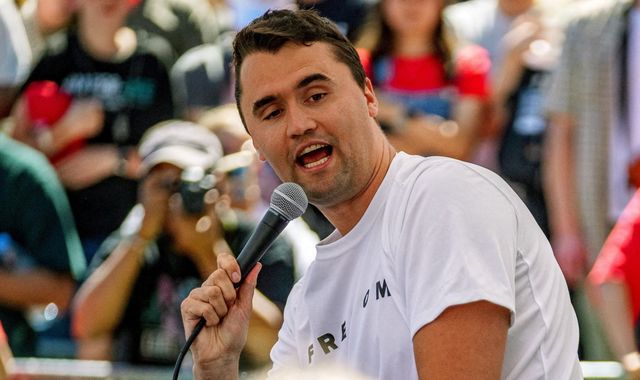
Yet amid the analysis, statistics, and public discourse, the human story remains the most striking. Brittany Kirk’s recollections, the children’s loss, and the countless students who witnessed the incident are the enduring echoes of a moment frozen in horror. That last phone call—the ordinary words now forever entwined with tragedy—serves as a haunting testament to the fragility of life and the shocking reality that danger can lurk in even the most familiar interactions.
The story of Charlie Kirk is now a cautionary tale about awareness, intuition, and the unthinkable consequences of sudden violence. It is a reminder that even in the midst of normalcy—laughing with a loved one, discussing plans, sharing reminders—life can pivot in an instant from routine to catastrophe. For Brittany and countless others affected, the final phone call is more than just words; it is a symbol of love, loss, and the chilling unpredictability of fate.
As the nation continues to grapple with the emotional aftermath, the echoes of that last conversation serve as a painful but enduring reminder: tragedy can strike without warning, and the most mundane moments can carry unimaginable weight in hindsight. The call that seemed ordinary at the time now stands as a chilling monument to the life that was lost, the horror that unfolded, and the unspoken truths that we often overlook until it is far too late.
